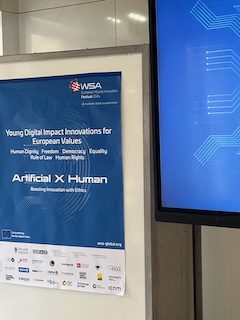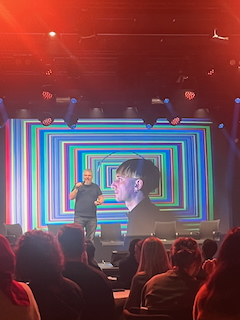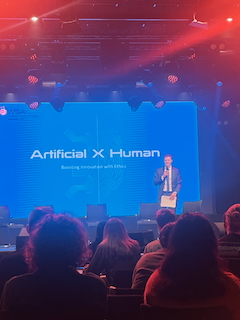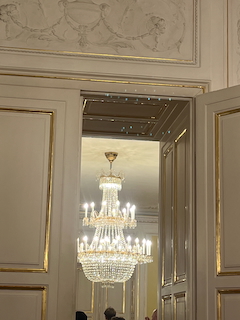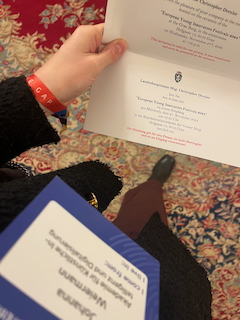Workshops, Winners, and Why AI Ethics Matter – My Takeaways from this ESG startup festival
- Johanna Weiermann

- Dec 3, 2024
- 4 min read
Updated: Jul 16
When I arrived at the European Young Innovators Festival 2024, I knew I was stepping into a space that celebrated innovation, impact, and European cooperation. Over three days, I had the privilege of both leading a workshop and serving as a jury member—two roles that not only challenged me professionally but also reinforced my belief in the transformative power of ethical AI and responsible innovation.
Ethical AI for Work: A Responsible Approach
My workshop, "How AI Can Make My Work Easier—Ethically," centered on a question that resonates deeply with my professional journey: How can we harness AI’s potential without compromising our values? This session brought together professionals eager to integrate AI into their workflows while ensuring that efficiency does not come at the cost of ethics. Through discussions, we explored practical applications of AI that streamline tasks, support decision-making, and enhance creativity—without falling into the trap of blind automation or algorithmic biases.
It was a powerful reminder that AI is not just a tool but a responsibility. The conversations reinforced the need for organizations to embed ethical frameworks into AI adoption, ensuring that technology serves as an enabler rather than a disruptor of fairness and inclusivity.
BTW: If you’re interested in learning more about my workshops or keynotes, or would like to explore a tailored AI training session for your team, feel free to contact me or visit my speaker profile.
How AI Ethics and ESG Drive Impactful Innovation
Serving as a jury member at the festival was both an honor and a revelation. I had the opportunity to engage with pioneering startups whose work is not just commercially viable but socially transformative. Among them, three projects stood out:
SignAvatar: An AI-powered solution that converts audible public announcements into sign language and multiple languages in text, making public spaces more accessible to the deaf and hard of hearing.
Language Supp Ukraina: A free digital platform helping young Ukrainian refugees integrate into Polish society through language learning.
Independo: A software startup developing assistive technologies, including a digital calendar designed with symbols and audio for individuals with learning difficulties.
The sheer ambition and impact of these initiatives were inspiring. It was particularly encouraging to see business models that seamlessly integrated purpose with sustainability—proof that profitability and social good are not mutually exclusive.
Festival highlights in pictures
(Excuse the blurry moments, but innovation doesn’t stand still! 😉)
Reconnecting with ESG and a Refreshing EU Perspective
A personal highlight of the festival was re-entering the ESG (Environmental, Social, and Governance) conversation. Having been involved in sustainable initiatives before ESG became a mainstream term (such as my master's thesis on sustainable supply chains), it felt like a homecoming to be among like-minded professionals dedicated to responsible business practices.
A particularly refreshing moment came from Christian Wigand, Acting Head of the European Commission’s Representation in Austria, who countered the all-too-common narrative that the EU is a bureaucratic hindrance to innovation. His insights on how the EU plans to close the innovation gap with the US—including mobilizing European capital markets to finance startups—were a necessary counterpoint to the skepticism often heard at AI conferences.
Cyborg Ethics and the Future of Human-Tech Integration
Another standout moment was Adam Montandon’s talk on cyborg ethics. He shared the fascinating story of Neil Harbisson, the colorblind artist who, through technology, developed an "eyeborg" that allows him to perceive color as sound. This raised profound questions: Where do we draw the line between assistance and transformation? What happens when technology fundamentally alters human perception?
As someone working at the intersection of AI, media, and digital transformation, this session reinforced the need for ethical considerations in emerging technologies. The choices we make today will shape the kind of augmented humans we become tomorrow.
A Truly International Exchange
Beyond the formal sessions, the festival was a melting pot of international professionals. It reminded me of my time living, studying, and working in Paris, London, and Goa—environments where diverse perspectives fuel creativity. Graz, for those three days, was exactly that: a place where borders dissolved, and collaboration thrived.
Looking Ahead
As I reflect on this experience, one key takeaway stands out: Innovation should not just be about what technology can do, but what it should do. Ethical AI, responsible business models, and European cooperation are not just theoretical ideals—they are tangible strategies that can drive meaningful change.
This trip reinforced my commitment to ESG-driven digital transformation, ensuring AI ethics remain at the core of innovation. Moving forward, I plan to integrate these learnings into my work—continuing to advocate for AI that serves humanity, businesses that balance purpose with profit, and European innovation that leverages its unique strengths.
Graz was not just a festival; it was a reminder of why I do what I do. And for that, I am grateful.
If you’re interested in learning more about my workshops or keynotes, or would like to explore a tailored AI training session for your team, feel free to visit my speaker profile and get in touch!

